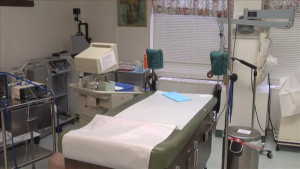SCOTUS Delays Implementation of Quality/Safety Regulations of Texas Abortion Clinics
By Dr. James Palermo // July 1, 2015
DECISION ALLOWS CLINICS NOT MEETING STANDARDS TO REMAIN OPEN

DECISION ALLOWS CLINICS NOT MEETING STANDARDS TO REMAIN OPEN
A Texas law, which was set to take effect this week to require abortion clinics in the state to meet standards for ambulatory surgical centers, and for doctors performing abortions to have admitting privileges at a nearby hospital was temporarily blocked by a 5-4 vote of the U.S. Supreme Court (SCOTUS).
The SCOTUS ruling allows Texas abortion clinics that do not meet the requirements of the law to remain open while the justices consider whether to hear an appeal from a Fifth Circuit Court of Appeals decision effectively ordering them to close because they didn’t meet the safety requirements set forth in the law.
ABORTION PROVIDERS AND ADVOCATES CLAIM LAW PLOY TO LIMIT ACCESS TO ABORTION
According to abortion rights groups, the strict requirements on abortion providers would have led to the closures of all but nine of the approximately 20 clinics in the state.
The ruling strongly suggests that the justices will hear the full appeal, which would probably be in 2016 and could be the biggest abortion case at the SCOTUS in nearly 25 years.

Abortion providers and advocates claim the regulations were expensive, unnecessary and a scheme focused on putting many abortion clinics out of business by the Republican-dominated legislature, and praised the Supreme Court’s decision as a kind of temporary victory, saying they were confident the justices would ultimately decide to review the case.
Amy Hagstrom Miller, the chief executive of Whole Woman’s Health, one of the abortion providers that sued Texas over the law, praised the Supreme Court’s ruling.
“We’re relieved that the high court has, once again, prevented anti-choice politicians from pushing safe and affordable abortion care entirely out of reach for Texas women,” Miller said in a statement.
LAWMAKERS SITE QUALITY AND SAFETY STANDARDS AS IMPETUS FOR LAW
The Texas Legislature passed and then Governor Rick Perry signed the bill into law in July 2013. Perry, who is running for president, said in a statement on Monday that the Supreme Court’s stay “unnecessarily puts lives in danger by allowing unsafe facilities to continue to perform abortions.”

“I am confident the court will ultimately uphold these common-sense measures to protect the health and safety of Texas women,” he added.
Last June the U.S. Court of Appeals for the Fifth Circuit in New Orleans ruled that the law, with minor exceptions, did not place an undue burden on the constitutional right to abortion. But opponents to the law have argued vehemently that it was designed to restrict access to abortion.
Texas Republican leaders have defended the law based on their intent and responsibility to ensure the highest quality and safe medical care for those women seeking abortions in Texas.
“Texas will continue to fight for higher-quality health care standards for women while protecting our most vulnerable — the unborn, and I’m confident the Supreme Court will ultimately uphold this law.” — Texas Gov. Greg Abbott
Texas Gov. Greg Abbott said in a statement, “Texas will continue to fight for higher-quality health care standards for women while protecting our most vulnerable — the unborn, and I’m confident the Supreme Court will ultimately uphold this law.”
The state’s Republican lieutenant governor, Dan Patrick, an outspoken opponent of abortion said in a statement that the Supreme Court was “continuing their attack on states’ rights with a narrow majority of activist justices.”
ROE V. WADE: STATES — PROTECT PRENATAL LIFE AND WOMEN’S HEALTH
In 1973 the SCOTUS ruled on Roe v. Wade, establishing the right to privacy under the due process clause of the 14th Amendment extended to a woman’s decision to have an abortion, but that this right must be balanced against the state’s two legitimate interests in regulating abortions: protecting prenatal life and protecting women’s health.

I find it incongruous, if not absurd, that the SCOTUS would even consider hearing arguments related to a state’s legitimate concern for and purview over maternal and fetal safety, and the quality of care provided at abortion clinics.
State and federal healthcare regulatory agencies hold all other medical/surgical providers in all specialties to very high standards related to buildings, equipment and staffing, including physician credentialing and hospital privileges at a local hospital so that there is continuity of care if there are complications from an outpatient procedure necessitating emergency care and/or admission.
Why shouldn’t an abortion clinic be held to those same standards?
‘ENHANCE AND PROTECT THE WELL-BEING OF ALL AMERICANS’
It seems to me that the Supreme Court’s reprieve to delay the implementation of provisions of a state statute that establishes abortion clinic quality and safety regulations required of other outpatient clinics and surgery centers flies in the face of the U.S. Department of Health & Human Services’ (HHS) mission “to enhance and protect the health and well-being of all Americans.”

The opponents of the law suggest that the expense to implement the provisions of the law may “put some clinics out of business.”
If indeed it’s a matter of money, perhaps those clinics that are structured such that they can comply with the quality and safety provisions of the law will establish a best-practice business model to be used across the state.
Rather than deride the proponents of the law as “sneaky, underhanded schemers attempting to limit abortion access,” as abortion advocates have claimed, the primary focus of all involved must be on ensuring the safety of the clinic patients by investing time, energy and effort in bringing abortion clinics in Texas, and everywhere for that matter, up to the standards established for the rest of the medical community.












